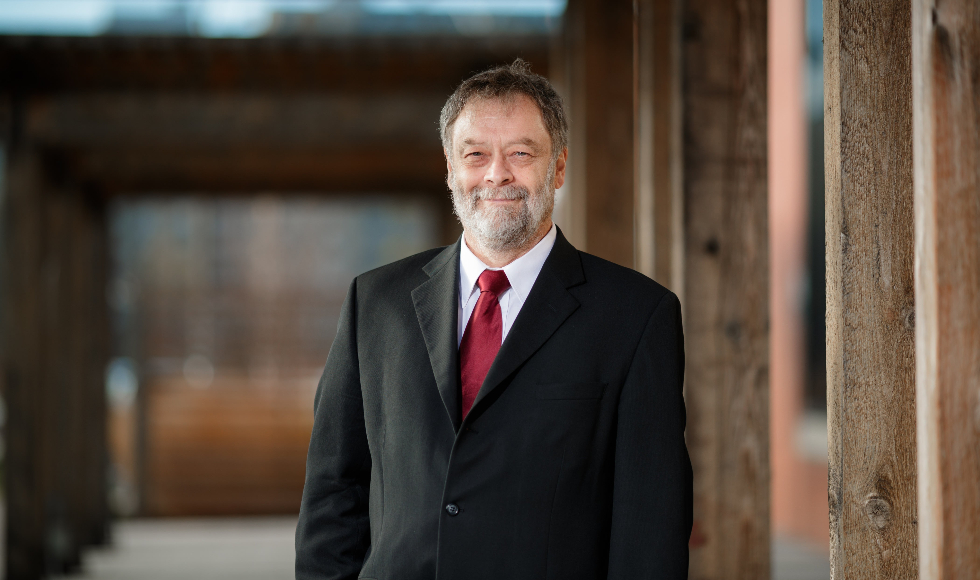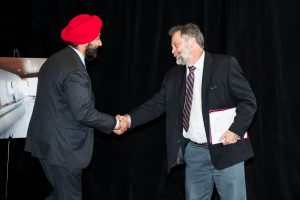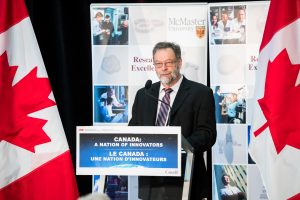Rob Baker — Curious, authentic and a man of his word

Photo by Ron Scheffler.
“There is no way I’m ever leaving university. I’m going to stay in this kind of place forever.” That was Rob Baker, circa 1971, about two weeks into his undergraduate studies at the University of Guelph.
Baker’s known to be a man of his word, so it’s really no surprise that he did as he said. He never did leave university, although he jumped around to more than a few, leaving his indelible mark as a first-class student, leading researcher and skilled administrator along the way.
Baker wrapped up his formal university career on May 31, 2019 – a career that spanned nearly five decades, three provinces and five universities. McMaster University was his last stop – saving the best for last, as it were – where he served as Dean of Science and Vice-President, Research, respectively. He decided to step away to focus on his mental health, his wood-working hobby, and his first grandchild who’s expected to arrive in July.
McMaster’s outgoing president, Patrick Deane, lauded Baker’s accomplishments and contributions, and summed him up in one word: authentic.
“Rob brings so much to the table, in so many ways, but never have I worked with someone who is so completely authentic,” says Deane.
“Rob is so naturally free of prejudices. He listens and he learns; and when he discovers the truth of a situation that doesn’t match what he’s been told, he’s quick to change his mind.”
A first-generation university student, Baker credits two people for pointing him toward university and marine biology, in particular.
The first: his father, a third-generation Canadian National Railway locomotive engineer, whose path Baker had initially thought he might follow, was his strongest advocate.
The second and more unlikely suspect: Jacques Cousteau, the great explorer, photographer and filmmaker, who brought all things aquatic to life.
“The way he showed the underwater world was just so fantastic, I just couldn’t get enough,” says Baker, reflecting back on those early TV episodes.
Baker’s passion for science, or as he says, “anything that is alive,” began at an early age. He was a good student, yet he got bored easily, but never when it came to studying living organisms.
“I loved learning. I was always so curious; still am,” says Baker.
When he speaks of his early and natural curiosity, it’s easy to understand his balanced approach to both fundamental and applied research – a key feature in McMaster’s five-year strategic research plan of which he was chief architect.
It was that continuous thirst for knowledge that landed him at the University of Alberta, where he earned a master’s degree focused on insect behavior; a PhD focused on the interactions of populations; and a date with his classmate Maureen – his now wife of 40 years.
Just one year into his postdoc at the Institute of Animal Resource Ecology at the University of British Columbia, Baker got tapped for a faculty appointment at the University of Toronto, where he spent the next 31 years in progressive senior faculty and administration roles.
It was at U of T where he honed his now-hallmark strategic management skills and became the go-to-guy for reorganizing programs and departments.
David Farrar, McMaster’s acting president, first worked with Baker at U of T and says he had a reputation as a creative, thoughtful and skilled administrator.
“Rob was highly regarded for his depth of knowledge and his great values; his ability to drive consensus and to engage all stakeholders,” says Farrar.

Baker was vice-dean of research and infrastructure at U of T’s Faculty of Arts & Science when he learned of the McMaster opportunity and decided to make the leap as both the timing and the place seemed just right.
“I was well aware of McMaster’s reputation, and the more I learned, the more it felt like a great fit,” says Baker, adding the move was also appealing because it allowed him to be closer to his Hamilton-based parents and the opportunity to live in a rural area.
In 2013, Baker became McMaster’s Dean of Science and soon after was met head-on with the repercussions of the then-new budget model.
For Maureen MacDonald, Baker’s successor as Dean, it was Baker’s disposition, ability to listen and capacity to gather consensus, that set the Faculty on its upward trajectory.
“That kind of leadership – bringing everyone along and, ultimately, operationalizing a plan – takes a lot of emotional energy,” says MacDonald.
On a personal note, she recalls her first conversation with Baker while on research leave in the UK. Never having met him, MacDonald sent him an email about the UK’s Athena SWAN program – designed to advance women in STEM fields. She was pleasantly surprised when he replied immediately and wanted to learn more. It’s worth noting that McMaster, under Baker’s tenure as vice-president, was among Canda’s first universities to sign the Dimensions Charter – Canada’s version of Athena SWAN.
“He not only listens, but honestly hears. It’s an amazing gift,” she says, only half-joking when she suggests it’s because he isn’t distracted by a cell phone (he doesn’t use one!) and only ever has one piece of paper on his desk at a time.
Farrar says Baker’s deep academic values and administrative skills were critical for the development of the Strategic Research Plan which has laid the foundation for the Brighter World Research Initiative – an effort to attract further philanthropic, government and industry investments.

They were also necessary for when he reimagined the role of the McMaster Innovation Park and its CEO, in keeping with the University’s priorities and commercialization efforts.
And, his thoughtful, self-reflective approach – knowing what he doesn’t know and taking the time to learn in order to move forward – has served him well in every role, and was particularly valuable working with the McMaster Indigenous Research Institute (MIRI).
MIRI was established at the same time Baker became vice-president in 2016, and he considers the opportunity to have played a role in its early years, as some of most important work of his entire career.
“Without question, working with and learning from our Indigenous scholars and community leaders was a highlight for me,” he says, adding he’s “richer and wiser” from the experience.
Chelsea Gable, Canada Research Chair in Indigenous Well-Being, Community Engagement and Innovation, served as MIRI’s director for two years and says Baker became a true friend and mentor.
“Not only is he an incredibly strong supporter of Indigenous issues and reconciliation efforts at McMaster, but he has a remarkable ability to touch people personally, to inspire giving and to lead,” she says, adding those qualities earned him the “utmost respect and gratitude” from the Indigenous community.
Baker was also integral to advancing the University’s broader development opportunities and priorities.
Lorna Somers, McMaster’s assistant vice-president, development, turned to Baker more than a few times for his expert advice; but not always the kind you might think.
“Rob helped us to move our development initiatives forward in so many ways, particularly through the Strategic Research Plan,” says Somers.
“But he made the mistake of opening the door, as he’s done for so many of us, and I took full advantage of his love for science,” she says of her endless parade of specimens she delivered to his office.
“I sleep better knowing the snake in my basement isn’t a rattler and the bear tooth on my lawn isn’t from a recent prowler,” says Somers.
“Rob is one-of-a-kind – as a leader, a scientist and a gentleman, and McMaster is greater for having him.”
It’s his love of nature that made him the perfect fit to take the lead on the President’s Advisory Committee for Natural Lands, where he worked alongside David Galbraith, Royal Botanical Garden’s head of science.
Gailbrath said both institutions benefited from Baker’s hands-on approach, which ultimately led to a long-term agreement between the two institutions, after years of preparatory work.
“Rob joined RBG staff on Cootes Paradise Marsh and other RBG wetland sites to see, first-hand, how restoration work is transforming this large, vital wetland that has benefited from intensive study by McMaster University faculty and students.”
Baker’s looking forward to this next chapter, enjoying some quality family time and finishing the crib he’s building for his new grandchild. And after vowing he’d never leave university, well, he’s sticking to his word.
Farrar confirmed Baker will continue to provide strategic advice on research and commercialization to both him and the acting vice-president, research, Karen Mossman.


